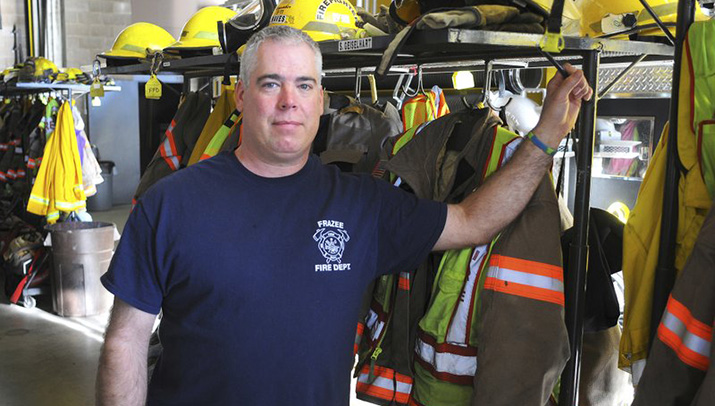Talking about the elephant in the room
June 25, 2018

“Scott, we’ve gotcha.”
These three words saved Scott Geiselhart’s life in 2014. Hours before, the volunteer firefighter and father of two had attempted suicide with what he thought was a fail-safe method. But his method failed. Scott believes that happened for a reason.
In the 1990s, Scott’s fire department acquired a Jaws of Life. “We trained hard and started going out on calls,” Scott says. “We saw a lot of fatalities right off the bat.” Scott started having nightmares, seeing his kids in the gnarled remains of the cars he pulled apart. He started self-medicating with alcohol, and later, meth. Looking back over the string of people he couldn’t save, he thought, “We’re doing everything right, and they’re still dying. I am the common denominator. Am I jinxed?”
By 2012, Scott’s girlfriend had moved out, taking their kids with her, and Scott had no desire to live anymore. He hated everything: the fire department, the firefighters, the trucks. “The anger was just amazing,” Scott says. He started doing at least a line of meth an hour.
After a furious rage at his ex-girlfriend and kids in July of 2014, Scott realized, “I had to stop myself or I was going to physically hurt somebody.” When his suicide attempt didn’t work that night, “I literally did a Google search and entered ‘anger,’ ‘nightmares,’ ‘flashbacks’ and ‘meth.’” The result? Post-traumatic stress disorder, or PTSD. “I couldn’t believe it. I thought PTSD was only a military thing,” he marvels. “No one ever talked about it. I didn’t even know what PTSD stood for!”
You might think realizing he had PTSD would have upset Scott, but it had the exact opposite effect. He finally knew what was wrong, that he wasn’t crazy, that he could get therapy and treatment for it. And that’s exactly what he attempted to do. He called a suicide hotline 12 times and got no answer. He called a list of numbers he had collected over the years. They were all out of order. He called a friend who said he’d come take Scott to the hospital, where they would lock him up. He called a crisis center, who made an appointment for him for a week and a half later.
“I hung up the phone and knew I would be dead by sunset,” Scott says quietly. He had one more number: that of the Share the Load Program, a helpline for firefighters and EMS. A firefighter answered the phone and said the words he so desperately needed to hear: “Scott, we’ve gotcha.”
Share the Load helped get him into therapy the next day. He walked away from meth, dealt with his anger, and is repairing his relationships with his kids. As he puts it, “I see in color again.” Scott now travels the country talking to other first responders about his experience. “So many people are hurting,” he says. “And they feel they’re alone. But I’m talking about the elephant in the room that everyone wants to sweep under the rug.”
Scott recognizes that suicide is a daunting trend among first responders. “More firefighters are killing themselves than are dying in line-of-duty deaths. Some chiefs are saying, ‘If you have PTSD, you’re off our department.’ So they’re saying it’s OK if you have PTSD, but don’t tell anybody about it.”
So how can we turn the tide? “More training, more education, more acceptance,” Scott answers firmly. He encourages first responders to debrief honestly with one another and their chiefs after tough calls. Most importantly, though, “We gotta get proactive on this. I want to come out and speak before the suicide and PTSD. Let’s not wait until after the fact.”
Scott sums it up: “We would never put a firefighter into a burning house without their breathing apparatus on, and yet we’re sending firefighters into traumatic events without talking about PTSD first. We have to prepare them beforehand and help them afterward.”
If you want Scott to speak at your fire department, the cost is eligible for reimbursement through MBFTE. Learn more on Scott’s website and the MBFTE website. If you or someone you know is considering suicide, call the National Suicide Prevention Lifeline at 800-273-8255 or the Share the Load Helpline at 888-731-3473. If you want to contact Scott directly, you can email him.

